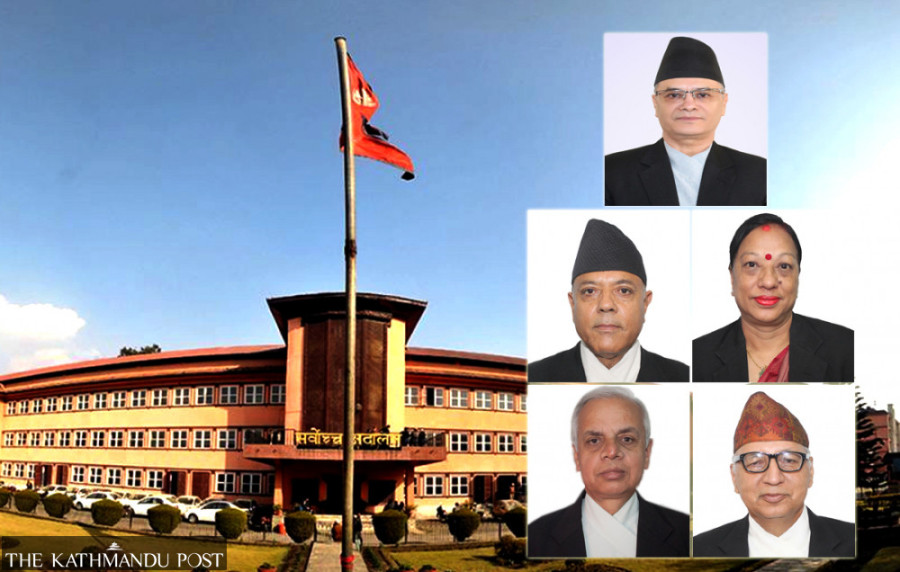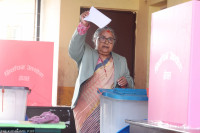Politics
Nepal top court restores House, orders to appoint Congress chief new prime minister
Court order ends the three and a half years’ stint of KP Sharma Oli who assumed office in February 2018 with a mandate to govern for five years.
Tika R Pradhan
The Supreme Court on Monday, in yet another landmark verdict, overturned Prime Minister KP Sharma Oli’s May 21 decision to dissolve the House of Representatives and ordered appointment of Sher Bahadur Deuba, Nepali Congress president, as prime minister by 5pm Tuesday.
The five-member Constitutional Bench led by Chief Justice Cholendra Shumsher Rana said that Oli’s claim to the post of prime minister as per Article 76 (5) was unconstitutional.
Reinstating the House yet again–the court had restored the House earlier on February 23 after Oli dissolved it on December 20–the bench has ordered to make arrangements for holding the House meeting by 5pm July 18.
Monday’s court verdict is expected to end months of political turbulence, but experts on constitutional matters said the bench has minutely examined various issues raised in the aftermath of the May 21 House dissolution so as to help understand the constitution.
The court verdict primarily has saved the constitution from unravelling, and it has also set a precedent for future prime ministers–that they cannot dissolve the Parliament on a whim and for their short-term political gains, according to experts.
“This verdict has ensured the constitution’s longevity, and with a strongly worded verdict, the court has told the authorities to stop making a mockery of the constitution,” said Bhimarjun Acharya, an advocate who specialises on constitutional law. “Today’s ruling has brought the constitution back on track. All in all, it is the victory of the rule of law, constitutionalism, independence of judiciary and democracy.”
The Constitutional Bench, consisting of Cholendra Shumsher JB Rana, Deepak Kumar Karki, Mira Khadka, Ishwar Khatiwada and Ananda Mohan Bhattarai, in its 167-page full text of the verdict has paid fastidious attention to some pertinent questions raised by the May 21 House dissolution vis-a-vis–whether the President's actions come under a judicial review, whether Article 76 (5) gives the President discretionary powers or constitutional authority, and if a prime minister elected under Article 76 (3) can stake a claim to the post again under Article 76 (5) despite failing a confidence vote.
Similarly, the court has also looked into whether a lawmaker has to have the party backing to support a candidate for the post of prime minister under Article 76 (5), who should–the President or the Parliament– test the basis of a majority claim, and whether there was any malafide intention in dissolving the House.
In its order, the bench said President Bidya Devi Bhandari’s decision to reject Deuba’s claim to form a new government under Article 76 (5), as called by her, is unconstitutional.
Oli on May 20 recommended that the President invoke Article 76 (5) which says in cases where the prime minister appointed under Article 76 (3) fails to obtain a vote of confidence under Article 76 (4) and any member under Article 76 (2) presents a ground on which he or she can obtain a vote of confidence in the House, the President shall appoint such member as prime minister.
Oli’s recommendation came a week after he was appointed prime minister under Article 76 (3) following his failure to win a vote of confidence on May 10.
Accordingly, Bhandari had given until 9pm May 21 to form a new government under Article 76 (5). When Deuba laid claim to the post of prime minister with the signatures of 149 lawmakers, including 26 from Oli’s CPN-UML, Oli too made a similar claim saying he had the support of 153 lawmakers.
“As the prime minister appointed as per Article 76 (3) of the constitution did not seek a vote of confidence from the House of Representatives, or as he forewent that process, and as he cannot present a claim to be appointed prime minister as per Article 76 (5), a claim by Oli, who could not get the vote of confidence, to form a government as per Article 76 (5) does not conform to the constitution,” the bench observed. “The decision that the claim of Sher Bahadur Deuba to be appointed prime minister saying he has the support of 149 members of the House of Representatives is insufficient has been quashed with this order of certiorari.”
The justices, in their unanimous decision, said that it would be appropriate to start the process from where the mistake was made.
“Since Article 76 (5) of the constitution has the clause ‘if any member of the House presents a ground on which s/he can obtain a vote of confidence in the House’, and for that purpose, the claim with 149 members of the House (majority members) should be taken as a sufficient and appropriate basis,” the bench ruled. “Therefore an order of mandamus has been issued in the name of the Office of the President and the reinstated House to appoint the member of the House who presented his claim for prime minister within two days from today (or by Tuesday 5pm) and complete the process of getting the vote of confidence as per Article 76 (6) of the constitution.”
Article 76 (6) says a prime minister appointed under Article 76 (5) must secure a vote of confidence within 30 days from the date of appointment.
Bipin Adhikari, former dean of Kathmandu University School of Law, said that the Supreme Court’s verdict seems to have been guided by fears that it may not get implemented.
“After all, the court, while delivering justice, must create an environment for the implementation of its verdict,” said Adhikari.
As Oli was pulling out all the stops to woo the dissident group of his party, led by Madhav Kumar Nepal, and prevent Deuba from becoming prime minister, speculations were rife a court order to Oli to go for a floor test could help him emerge even stronger.
By managing to win over the Nepal faction, whose 23 lawmakers from the dissolved House are supporting Deuba, Oli was trying to win the vote of confidence in the House in case the order came to that effect.
“It looks like the court tried to pre-empt the President, considering the possibility of any action from her at the behest of the current prime minister,” Adhikari told the Post. “Therefore, the court issued an order to appoint someone else [Deuba] prime minister.”
Some experts say they found the court going to the extent of issuing an order to appoint someone a prime minister as “judicial activism.”
Anup Raj Sharma, a former chief justice, told the Post that though he disagrees with some of the points of the verdict, he would not hesitate to call it historic and bold.
“It looks like the bench had some apprehensions that Oli could create more problems if he is allowed more time,” said Sharma. “The bench wanted to leave no room for avoiding the implementation of the verdict.”
According to Sharma, the Supreme Court has once again upheld constitutionalism and saved the constitution from its possible derailing.
“The judiciary has sent a strong message that Parliament dissolution is not possible on the whims of a prime minister,” Sharma told the Post. “The verdict also shows that the court can take bold decisions whenever necessary.”
By ordering to make arrangements for Deuba’s vote of confidence in the reinstated House, the bench has also made an attempt to return politics to where it belongs and in the hands of political actors.
Ever since Oli dissolved the House for the first time, he had set in motion a series of events that had political ramifications, and everyone was reaching the court for redressal, thereby creating fears among many that the political process was getting out of political actors’ hands.
The court, through its verdict, has also sent a clear message to the Office of the President that whether a prime minister has a majority is tested in the House where people’s elected representatives reside, not in Sheetal Niwas.
According to Adhikari, the law professor, the court has made it very clear that the President should not play the role of a justice.
The bench has also shed light on Article 76 (5), the fourth and last provision in the constitution for the formation of a government, and its intent.
Interpreting Article 76 (5), the Constitutional Bench said that every lawmaker has an agency of their own. The ruling is in reference to the claims made by the lawyers pleading on behalf of Oli and Bhandari, who said if lawmakers are allowed to make their own choices, this would lead to a party-less system.
“As action cannot be taken for abandoning the party as per Political Parties Act-2017 for expressing confidence or support in the provision of appointment of the prime minister as per Article 76 (5), a prohibitory order has been issued in the name of defendants not to take action against any member of the House of Representatives for expressing confidence, support, opinion or voting with regard to the appointment of the prime minister as per that provision,” said the bench.
Constitutional experts say the court has upheld constitutional morality, as everything is not written in the constitution, it has established constitutional supremacy.
“The more irresponsible a government becomes, the stricter the court becomes, but the judiciary steps back when the government of the day starts acting responsibly,” said Adhikari. “It’s the way constitutional courts have been functioning for a very long time.”




 11.97°C Kathmandu
11.97°C Kathmandu













